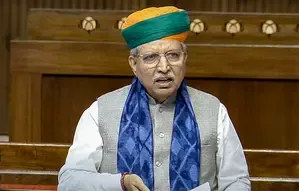Over 5.15 Crore Legal Cases Await Resolution in Indian Courts: Government Report

New Delhi, Dec 12 (NationPress) A staggering 5.15 crore legal cases are pending in numerous courts throughout India, encompassing the Supreme Court, High Courts, and District and Subordinate Courts, as disclosed to Parliament on Thursday.
The Minister of State (Independent Charge) for Law and Justice, Arjun Ram Meghwal, stated in a written response to the Rajya Sabha that there are 82,171 pending cases in the Supreme Court based on data from the National Judicial Data Grid (NJDG) as of November 30.
He further revealed that 57.82 lakh cases are pending in High Courts, while the District and Subordinate Courts account for an overwhelming 4.56 crore pending cases.
According to MoS Meghwal, the backlog of cases in courts is caused by several factors, such as the availability of physical infrastructure and the support of court personnel, the complexity of the cases, the nature of the evidence, collaboration among stakeholders including the bar, investigative bodies, witnesses, and litigants, as well as the effective application of rules and regulations.
He elaborated, "Additional reasons for delays in case resolution include the absence of a defined timeline by courts for the disposal of various types of cases, frequent adjournments, and insufficient measures to monitor, track, and consolidate cases for hearings."
MoS Meghwal informed the House that considering the population data from the 2011 Census, which recorded 1210.19 million, and the available information regarding the sanctioned number of judges in the Supreme Court, High Courts, and District and Subordinate Courts in 2024, the judge-population ratio in India is approximately 21 judges per million people.
Regarding the appointment of judges in High Courts, MoS Meghwal provided the following details: "In 2024, 34 new judges were appointed, 110 in 2023, 165 in 2022, 120 in 2021, 66 in 2020, and 81 in 2019."
He also mentioned that the number of judges appointed to the Supreme Court in 2024 was four, in 2023 fourteen, in 2022 three, in 2021 nine, and ten in 2019. Notably, there were no appointments made in 2020.






